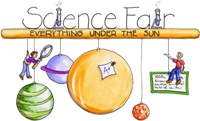

Hydrogen Production
The Objective : The experiment's objective was to use nanotechnology in the process of electrolysis of water to produce hydrogen to compare its efficiency to bulk metals. Clean energy is a world issue and hydrogen is one clean energy source. However, there is no cost effective way to produce hydrogen.
Methods/Materials
To test the efficiency of the electrodes, an electrolytic cell was built.
Four electrode types were obtained: nickel, SS304, SS316, and nickel/iron nano material.
A 30% solution of potassium hydroxide was prepared as an electrolyte.
Twelve voltage measurements per electrode type were split over three trials.
The theoretical voltage, or ideal voltage to pass between two electrodes in the process of electrolysis of water, 1.23 volts, was used as 100% efficiency to calculate and compare the efficiency of the electrodes.
Results
The 12 measurements per electrode were averaged and the voltage for SS304 was 2.33 volts, the voltage for SS316 was 2.19 volts, the voltage for nickel was 2.66 volts, and the voltage for the nano material was 2.15 volts.
The efficiency of the electrodes was calculated and SS304 had 52.79% efficiency, the SS316 had 56.16% efficiency, the nickel had 46.24% efficiency, and the nano material had 57.21% efficiency.
Although the gas produced by each electrode could not be measured as planned, it is justified that every electrode produced the same amount of gas by Faraday#s law of electrolysis which states that in an electrolytic cell, the amount of a substance produced at one end of the electrode is directly proportional to the amount of electricity that passes through the cell.
Therefore, the amount of gas produced by each electrode was constant because the same amount of voltage was applied.
Conclusions/Discussion
The most efficient electrode in the process of electrolysis of water to produce hydrogen was the nano material. This supported the hypothesis, however, the data did not support that nickel would be the next most efficient. In conclusion, scientists should further their research of the electrolysis of water with nano materials/metals due to the fact that they are more efficient in the production of hydrogen.
This project focus was to use cutting edge nanotechnology in the process of electrolysis of water to produce hydrogen to compare its efficiency to bulk metals.
Science Fair Project done By Emily M. Venable
<<Back To Topics Page...................................................................................>>Next Topic
Related Projects : Harvesting Healthy Energy from Exercise , Healing Power: Past or Present , Home Is Where the Heartburn Ends , Hovercraft Mania , How Do Varying Amplitudes , How Does Electromagnetic Radiation Affect A Colony of Harvester Ants , How Does Hydra littoralis Regenerate , How Does Shading Affect the Power Output of Different Solar Panel , Hummingbirds and Flower Preference , Hydrogen Production , Identifying Two Populations of Neurons , Improving Elevator Scheduling Efficiency , Investigating the Effectiveness of Natural Pesticides ,Is Green Clean or Mean? , Is It Easy Being "Green"?
Copyright © www.kidsprojects.info 2012 through 2014
Designed & Developed by Freddy